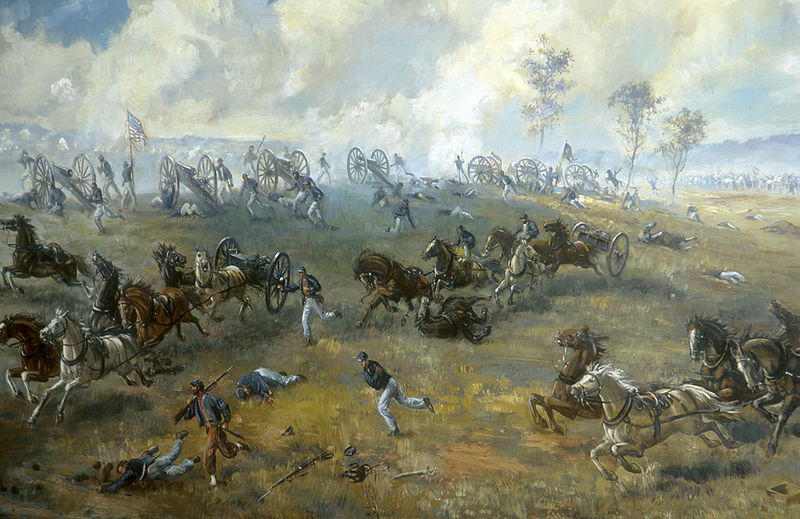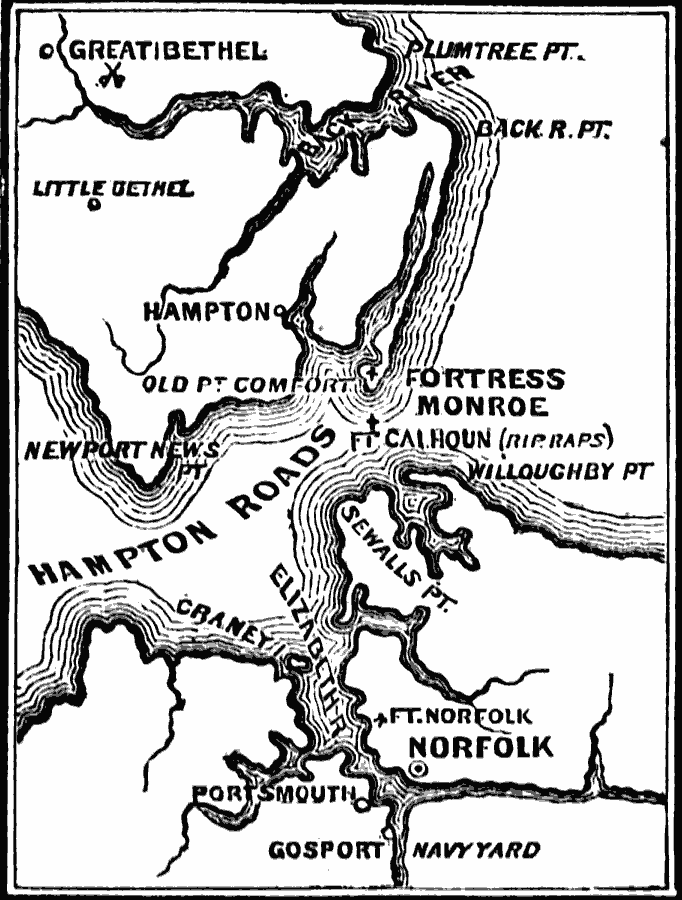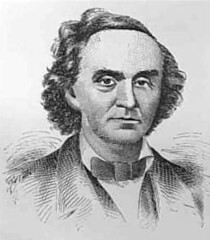 |
| US General Rickett's Battery fleeing the field at Manassas, Virginia |
- About 25 miles southwest of Washington the first major battle of the War places US Gen. Irvin McDowell’s 35,000, some of whom are regular troops against Confederate Generals P. G. T. Beauregard and Joseph E. Johnston’s 30,000 volunteers. With neither army well-trained and dressed in both blue and gray with similar flags, the day would shape up to be confusing. Unknown to McDowell’s troops situated at Sudley Ford on Bull Run, Johnston has combined forces with Jackson. McDowell hopes to surprise the Confederates by striking them on the left flank at the Stone Bridge, but after Northern Artillery opens at 5 o’clock in the morning, the Southerners learn of the Union advance. Confederate General N.G. Evans meets McDowell’s troops as they approach from Sudley Ford, holding the Southern position until around noon. The Confederates then fall back to Henry House Hill where Evans, Jackson, and others, make a strong stand. McDowell's feint on the Confederate front is believed to be the real attack until McDowell hits Beauregard's flank in force when McDowell’s forces advance on Henry House Hill around 2 o’clock as Beauregard and Johnston reinforce Evans’ tired troops. An order from Old Bory to Ewell directing an attack on McDowell's left does not reach him, but the stand that Thomas J. Jackson’s men take on the field in the midst of smoke and dust inspires Gen. Barnard Bee to rally his South Carolinians, “There stands Jackson like a stone wall. Let us determine to die here, and we will conquer.” Thus the famous sobriquet. Bee died in the next charge. Despite Union attempts to charge Henry House Hill, the Southerners hold fast and are successful in driving the Federals back in defeat. As Union forces press hard against the Confederate left flank, the 4th Alabama Volunteer Infantry plugs the gap while other Southern forces form a defensive line behind them. The 4th holds its ground for more than an hour, repulsing four assaults by Union troops. (The 4th Alabama would fight in every major engagement in the Eastern Theater of the war, surrendering less than 100 men at Appomattox in April 1865.) Finally the Confederates regroup and attack. As McDowell’s men pull away, panic strikes when a shell destroys a wagon which blocks the main road of retreat. Union troops scatter and run, every man for himself. Though for a time it could have gone the opposite direction, the Confederates rout McDowell at the Battle of Manassas Junction, Virginia. The battle is costly. Confederates lose 387 dead, 1,582 wounded, 13 missing. Union losses are 460 killed, 1,124 wounded, and 1,312 missing. President Jefferson Davis observes the Southern victory from Manassas, while in Washington, Lincoln, hearing of the complete defeat, sequesters himself with his Cabinet, and everyone North and South realize the war has begun with earnest./1861
- As Brigadier General Nathaniel Lyon is in the southwest portion of Missouri pursuing the secessionist Missouri State Guard, Unionist Missouri Home Guard companies are forming throughout the state, while stranded secessionists are still trying to organize. At Kahoka, Missouri, David Moore has been elected colonel of the 1st Northeast Missouri Home Guard Regiment, but he has dissension in his own command and a growing secessionist force under Colonel Martin E. Green of the Missouri State Guard’s 2nd Division at a training camp on the Horseshoe Bend of the Fabius River. Green has just formed the 1st Cavalry Regiment, 2nd Division, Missouri State Guard commanded by Lieutenant Colonel Joseph C. Porter and Major Benjamin W. Shacklett. Colonel Moore decides to strike the local secessionist and then fall back to Athens to be close to the Croton, Iowa, supply depot and support from the Iowa militia. On July 21, with the help of a company of Illinois militia and a company of Iowa Home Guards he attacks the village of Etna in Scotland County, Missouri, and drives off Shacklett's MSG cavalry. He then fell back to Athens./1861
| "There stands Jackson like a stone wall ..." |
 Image by The National Guard via Flickr Image by The National Guard via Flickr |
| 4th Alabama |
- Now back in Georgia, Robert Toombs, who has recently resigned as Confederate Secretary of State, is made a Brigadier General of a Georgia brigade./1861
- General Banks supersedes General Patterson in command of the Department of the Shenandoah. /1861
- The USS Albatross, under Naval Commander Prentiss, engages the CSS Beaufort, commanded by Lieutenant R. C. Duvall, in Oregon Inlet, North Carolina. The Albatross with heavier guns forces the Beaufort to withdraw./1861
Bull Run Animated Map from Civil War Trust on Vimeo.

































